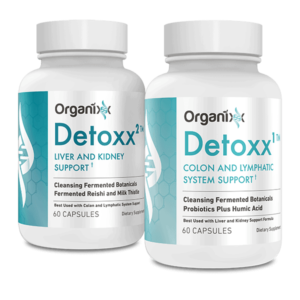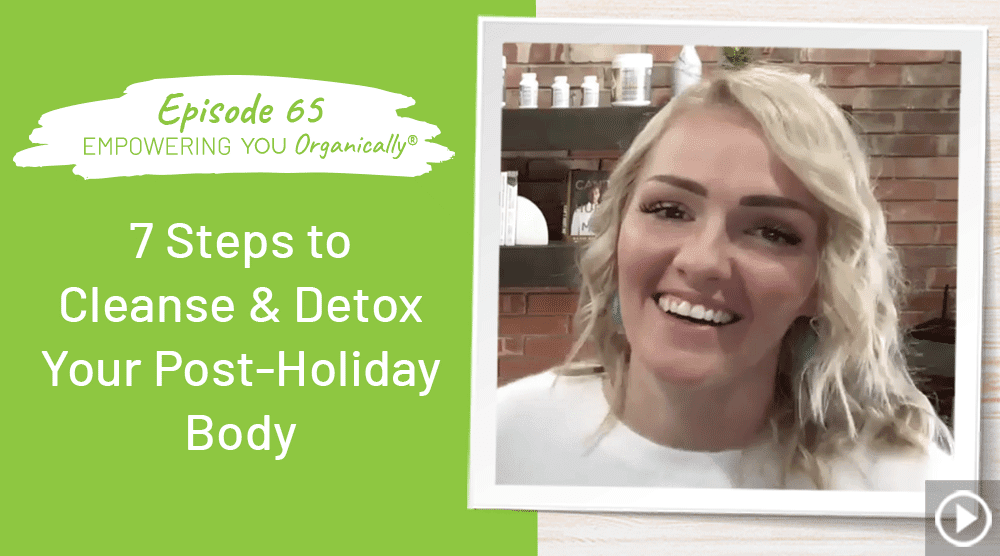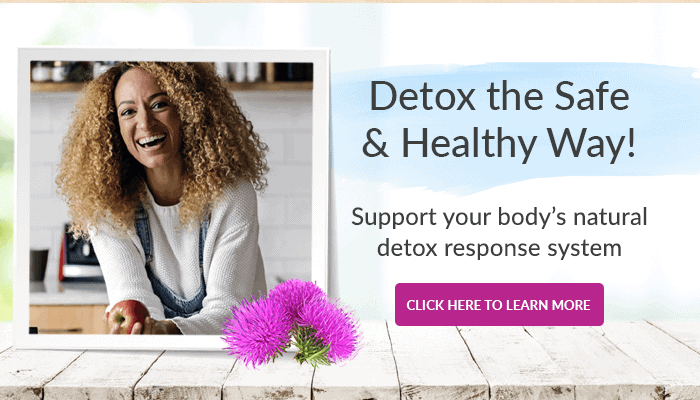Empowering you Organically – Season 8 – Episode 65
Title: 7 Steps to Cleanse & Detox Your Post-Holiday Body
Hosts: Jonathan Hunsaker, TeriAnn Trevenen
Description: The pace of life these days makes most of us feel stressed, frazzled, and just plain exhausted at the best of times. Add party treats, holiday feasts, and one too many libations to the mix… and a lot of us get the feeling right about now that doing a post-holiday detox would be a good idea.
But how do you cleanse and detox your body without spending hours doing research or breaking the bank? Detoxing doesn’t have to be complicated. One clever way to help your body’s own natural detoxification systems is to add some simple detox practices into your life on a daily basis.
Featured Product

- The easy, safe, ultra-effective way to cleanse your body of toxins.
- Cleanses your colon, lymphatic system, liver, and kidneys!
- All-natural organic ingredients.
- Proprietary fermentation process to maximize effectiveness.
* * *
What Does Detox Mean?
Detoxification refers to helping your body “clean out” your internal organs to rid them of bad bacteria, poisons, pollutants, and especially food waste.
Granted, your body is detoxifying itself all of the time. After all, that is part of the job description for the colon, lungs, kidneys, lymph glands, skin, and especially the liver.
However, with everything toxic that’s in our environment, combined with what we’re slathering on ourselves and ingesting, it’s a good idea to give your organs a helping hand periodically.
Focus on These 7 Key Areas for the Best Detox Cleanse
If you want to cleanse and detox your body the easy way, start small and take tiny steps in each of the seven broad categories listed below. If you’re consistent, over time you will establish healthy detoxification habits that will stay with (and benefit) you for a lifetime.
#1 – WHAT YOU EAT.
Let’s start with the basics. Your diet can either add to your toxic load or help you detoxify from it. Whole foods are what you are aiming for to help your body eliminate toxins. Greens like celery, spinach, parsley, kale, and cilantro contain fiber, phytonutrients, and chlorophyll (the substance that makes plants green).
Chlorophyll is especially great for detoxification since it cleanses the blood, is a super anti-inflammatory [1] and can bind with heavy metals. It also protects against DNA damage caused by Aflatoxin-B1 (AFB1) [2], which has been linked to liver cancer. [Note: Aflotoxins are cancer-causing substances produced by certain types of mold and are commonly found in peanuts, grains, corn, and cottonseed meal.]
And don’t forget fiber! Getting enough soluble and insoluble fiber in your diet every day is essential for pulling toxins out of the gut and cleaning the colon.
A 2015 study [3] published in the Annals of Internal Medicine found that people who simply ate 30 grams of fiber every day lost more weight and stabilized their blood pressure more than those who engaged in complicated dietary changes.
What You Can Do Now: Crowd out junk food slowly by focusing on your main meal of the day. Whether you consider this breakfast, lunch, or dinner, make sure you add a healthy amount of green vegetables to your plate.
If you don’t like salads, try steamed veggies sprinkled with a little sea salt and some extra virgin olive oil. Another option is to replace a meal with a nutrient-dense smoothie that includes healthy ingredients such as wild blueberries and broccoli sprouts.
#2 – WHAT YOU DRINK.
Besides eating healthy foods, drinking enough fresh, filtered water is absolutely vital for detoxification. Think of your bloodstream and intestines as a plumbing system. It takes water to flush all that bad stuff out of your body and down the drain.
Water is especially helpful for the kidneys since these glands need it to get rid of certain waste products. Make sure you drink only fresh, filtered, fluoride-free [4] water.
A good tip if plain water isn’t your thing is to add healthy substances to your water glass and turn them into detox waters. A very basic detox water is a little lemon juice added to 8 ounces of water first thing in the morning, which can help with alkalinity.
Plop some cucumber or a few watermelon slices in your water glass for a refreshing and hydrating treat.
To go for the big guns when it comes to health, try some apple cider vinegar (ACV) diluted in water first thing in the morning. Besides its amazing detox effects, ACV is chock full of vitamins and minerals [5], helps balance gut bacteria, and is amazingly immune-boosting. It also has antimicrobial and antifungal effects [6].
What You Can Do Now: For the next week, try drinking a tall glass of water first thing in the morning. If you want a real health boost, add a little bit of ACV in it. Start with a teaspoon and work up to a tablespoon or two in 8 ounces of water upon rising. Take note of the difference this one change can make in your overall energy levels throughout the day.
#3 – GO ORGANIC.
Going organic as much as possible in what you eat and drink can be a huge step towards living a low-toxin life.
A general rule of thumb for clean eating is to steer clear of commercially-raised meats and dairy.
According to the advocate organization Consumer Reports [7], a whopping 80% of antibiotics sold in the U.S. are used for livestock. In addition, commercial dairy may contain high levels of cancer-causing dioxins, since they are mostly stored in animal fat.
The World Health Organization found that the majority of human exposure to dangerous dioxins comes from animal products [8]. If you eat meat and dairy, make sure you get pasture-raised, hormone free, and organically-raised and non-GMO fed products only.
When it comes to fruits and vegetables, be aware of the “Dirty Dozen.” A current list is provided annually by the consumer safety organization, the Environmental Working Group (EWG).
What You Can Do Now: Go online and check out EWG’s current “Dirty Dozen” list [9] now (some of the foods on the listing can change from year to year). Then, make a point the next time you shop to go only organic for these particular fruits and vegetables.
#4 – HOW MUCH YOU EAT.
Wise individuals through the ages have recommended eating less and going on fasts to clean out the body and boost both physical and mental energy. Nowadays, research continues to pour in about the benefits of calorie restriction as well as routinely spending some time not eating at all.
The connection between fasting and detoxification is clear. Fasting kicks in “autophagy,” the process of cellular self-digestion. When the cells starve, they begin to eat themselves. This is a way of breaking down and getting rid of damaged cells, which are then used as recycled energy.
Studies show that fasting can rid the body of unwanted pathogens, improve brain health, and regulate metabolism.
Fasting is a great way for your body to “clean house”… and the best part is it’s free!
As it turns out, you don’t need to spend days sucking on ice cubes to gain the health benefits associated with fasting. “Intermittent Fasting” (IF) also stimulates autophagy. Intermittent fasting refers to alternating times for eating and not eating. Many individuals adopt the 16/8 rule. They fast for sixteen hours, including sleep time, and eat only during an eight-hour window (noon to 8 pm, for example).
A 2017 study conducted by the University of California, San Diego, found that intermittent fasting improved
“(a) circadian biology, (b) the gut microbiome, and (c) modifiable lifestyle behaviors, such as sleep.”
As far back as the early 1980s, researchers at City Hospital in Baltimore found that IF increases lifespan [10].
What You Can Do Now: Start with a food journal. Write down what you eat for one day, then reflect on it. Were there times that you ate even though you weren’t hungry? Perhaps you reached for that bag of chips because you were stressed or just bored?
Being aware of our eating patterns as they are right now is the first step in changing them. After a few days of observing what you eat, experiment with extending your non-eating time a little.
If you have hypothyroidism or adrenal fatigue, take it slow and monitor your energy. Be sure to seek the advice of your health care provider before you start if you have either one of these conditions.
#5 – HOW YOU MOVE.
Besides what you eat, getting enough physical activity is probably THE BEST thing you can do to keep your body detoxifying naturally every day. It may be hard to see the connection at first. Take a look at the links between exercise and detox, however, and you’ll be convinced:
- Aerobic exercise makes you sweat, which helps to eliminate toxins through the pores.
- Exercise in general increases and regulates breathing, which helps detox through the respiratory system.
- Aerobic exercise also pumps oxygen into the bloodstream, which cleans it out and increases blood flow. The faster the blood circulates, the faster lymph fluid can circulate as well.
- A 2018 study published in The Journal of Applied Physiologyfound that during a workout, muscles act much like the liver. They produce enzymes which clear out toxic chemicals [11].
- Aerobic exercise is a catalyst for the production of endorphins [12] other “feel good,” healing hormones.
- Taking a walk, stretching, doing tai chi, or moving your body in another way outdoors fills your body with hormone-balancing vitamin D, which assists all your organs and your detoxification pathways.
- Finally, it’s not just fast-paced cardio that can help you detox. Stretching activities such as yogacan help you as well. A 2018 study in the Indian Journal of Medical Specialties found that yoga helped pregnant women increase internally-produced antioxidants [13].
What Can You Do Now: Haven’t exercised in a while? Start slowly by committing to take a brisk walk around the block at least two times this week. Even a 15-minute jaunt on your lunch break can do wonders to get you moving again. Note the difference this little bit of movement may have on your overall energy level for the rest of the day.
#6 – HOW YOU HANDLE STRESS.
Being consistently stressed out can take a major toxic toll on your body. This is because chronic stress produces extra cortisol, which can lead to inflammation and sluggish systems that just get sluggish over time as they build up with waste.
Cortisol is surging through the body night and day also has the ability to shut down key immune system cells involved in hunting out and destroying viruses, bacteria, and other pathogens.
Stress can also change DNA, and those changes may be passed on to our children. Researchers at the University of Alabama found that traumatic and stressful events that happened early in life affect the BDNF gene [14]. BDNF is responsible for making certain proteins found in the brain and spinal cord.
The bottom line regarding stress is if it gets out of hand, it can absolutely lead to more toxic sludge in your body and a weakened immune system that will not be able to handle it.
What You Can Do Now: The opposite of the “stress response” for your body is the “relaxation response.” That is the sweet spot for detoxing since in this zone all of your metabolic energy is focused on healing the major organs, including your liver and kidneys.
The good news is that there are tons of ways you can employ to go from stressed to smiling. Exercise, hydrating, and eating healthy can help in this regard. So can meditation. You don’t have to spend hours at it to get results too.
A 2014 study published in the journal Psychoneuroendocrinology found had healthy individuals who practiced mindfulness meditation for just 25 minutes 3 days in a row experienced a lessening of psychological stress activity in the brain [15].
Again, start out slow with 5 to 10 minutes of observing the breath every day and go from there. When it comes to all the benefits meditation can have on the brain and body, consistency is key.
#7 – WHAT SUPPLEMENTS YOU TAKE.
Last but not least, there is the issue of supplements. Many experts feel that taking key quality supplements is a necessary part of leading a healthy life in our pollutant-riddled world.
We tend to agree. Luckily, we can now marry the wisdom of nature with advanced delivery systems. When it comes to detoxification, take synergistically compatible supplements. This will give you the support you need to kick your own natural detox mechanisms into full gear.
What Can You Do Now: How do you know what supplement is right for you and your detox pathways? For best results over time, we recommend a high-quality, organic, multi-nutrient supplement that is easy to take every day and gentle on the system. Detoxx by Organixx contains over 15 concentrated detoxification herbs, including parsley and Turkey Tail mushroom.
How Not to “Retox” Your Body
- Be mindful of what you’re putting in (AND on) your body is one of the best ways to not retox.
- Ongoing, stay away from the processed foods as much as possible, stick to the whole foods.
* * *
Subscribe to Empowering You Organically
Never miss an episode!
APPLE PODCASTS SPOTIFY GOOGLE PODCASTS




